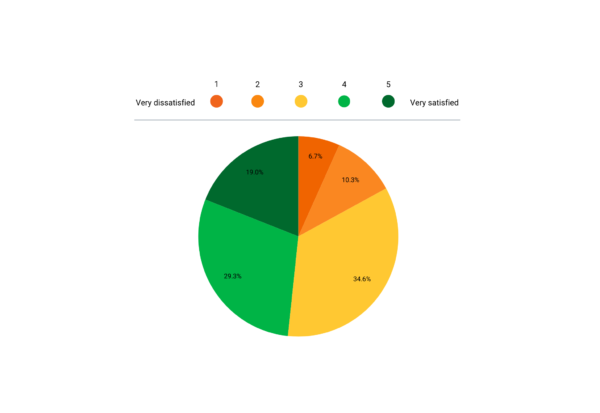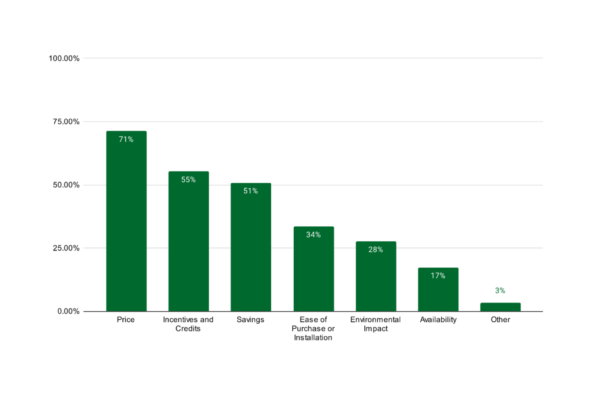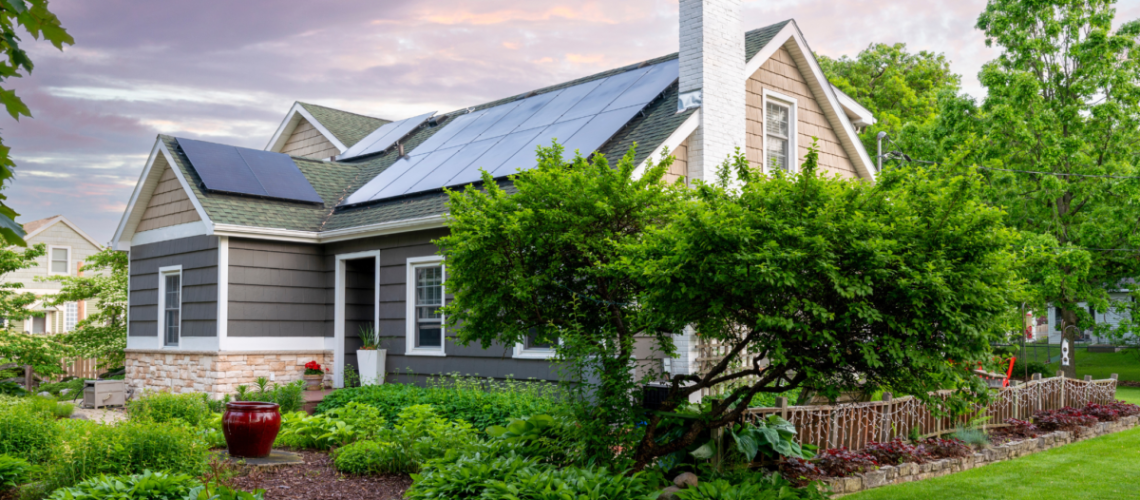The Inflation Reduction Act (IRA), signed into law in August, represents the single-largest investment by the federal government to combat climate change in U.S. history.
One of the most significant provisions of the infrastructure law is the long-term extension of the investment tax credit (ITC), which was instrumental in launching the U.S. solar industry. The bill calls for a 10-year extension of 30% of the cost of installed equipment to be tax exempt, falling to 26% in 2033, and 22% in 2034. That 30% credit also applies to energy storage, meaning retrofits of batteries to solar arrays can benefit. This is all good news for homeowners interested in high-efficiency appliances, sustainable building improvements, electric vehicles, battery storage devices, and solar panels. However, navigating the maze of incentives can be a challenge.
Palmetto Solar, a solar installer that’s been in business for 11 years and currently installing in 25 states, conducted a survey to determine which of the incentives people are most interested in. These include heat pumps, electric vehicles, additional solar panels, solar battery storage, and more.
A survey was sent to Palmetto customers across the U.S. who purchased a solar energy system in or prior to September 2022, when the survey was conducted. More than 350 Palmetto solar customers from 20+ states responded to the survey.
55% of respondents are located in the eastern United States.
About 20% of respondents were not yet producing power at the time the survey was conducted. While the respondents’ average system size was 24 panels, more than 50% of respondents purchased a 16 to 30 panel solar energy system.
The survey asked solar homeowners how satisfied they were with the energy efficiency of their home, with 1 being very dissatisfied and 5 being very satisfied. Most respondents fell into the 3 to 4 range, indicating some level of satisfaction but recognizing that there might be opportunities to improve their home’s energy usage and maximize their investment in solar energy.

More than 70% of respondents named price as a primary factor in the decision to invest in energy-efficient technology, while 55% named incentives and credits. Now that the Inflation Reduction Act incentivizes energy-efficiency upgrades, including home energy audits, high-efficiency (HE) appliances, and building envelope improvements, Palmetto is seeing a significant difference between adoption rates and interest—especially for solar battery storage and electric vehicles.
While only 5% of solar owners currently have battery storage, 61%, or 220 out of 358 respondents, said they are interested in investing in battery storage. EVs have even more interest, with only 11% of respondents having already invested in either a hybrid or electric vehicle, but more than 78% of respondents saying that they would be interested in a hybrid or electric vehicle as a result of the EV rebate outlined in the Inflation Reduction Act. The only category for which adoption rate exceeded interest was high-efficiency appliances, with 58% of respondents already having invested in at least one HE appliance for their home.
While regional differences emerged for both the adoption of and the interest in home energy-efficiency upgrades, solar battery storage showed the greatest opportunity for market growth, having an adoption rate of only 5% and the highest interest rate at 61%. Among the home energy-efficiency upgrades presented in the survey, solar battery storage captured the highest level of interest in four out of five U.S. markets. In the Northeast, however, battery storage came in second to HE appliances at 57% vs. 59% respectively. Overall interest was highest in the Western and Midwestern states, where 70% of homeowners indicated interest in smart home battery storage knowing that incentives may now be available.
When it comes to environmental impact, solar owners believe that electric or hybrid vehicles and smart home battery storage would have the greatest impact on reducing their carbon footprint— even over additional solar panels—with about a quarter of respondents voting for each. Narrowly behind them were high-efficiency appliances, which many solar owners have already invested in.
When asked which upgrades might have the greatest impact on their financial savings, respondents favored solar battery storage and additional solar panels. Just over a quarter of solar owners believe battery storage will have the greatest long-term impact on their financial savings. In contrast, while solar owners believe that electric vehicles have the greatest impact on the environment, battery powered cars ranked last in terms of long-term financial savings. This may be due to the higher perceived cost of purchase and ownership, even after the savings provided by the Inflation Reduction Act.
One more insight from the survey was that high-efficiency appliances, rather than battery storage or EVs, had the greatest perceived impact on one’s comfort and lifestyle. Battery storage, however, came in second at 24.8%—most likely due to the fact that batteries can mitigate outages and save additional money on electricity bills, depending on the area and utility. Home energy efficiency improvements, such as insulation, windows, and doors, came in third.
The purpose of the survey was to understand the factors that are going to motivate homeowners to invest in these home upgrades, whether it be price, environmental impact, or something else. It turns out that price is the most important factor when it comes to evaluating future investments in home or vehicle energy-efficiency upgrades, with more than 70% of respondents choosing price as their most important factor.

That said, more than half of all respondents reported that the incentives and credits (55%), along with the savings they receive (50%) are an important, if not the most important, factor when determining which upgrades to invest in. Both environmental impact and availability came second to last and last, respectively. Nearly 100 individuals voted ‘yes’ to environmental impact being a factor.
Finally, the survey asked an open-ended question: “How do the new credits and rebates impact your overall interest in energy efficiency investments?” Responses were then categorized by stated level or type of impact. Our results indicate that more than 58% of solar homeowners show an increased interest in energy-efficiency investments in response to the Inflation Reduction Act. An additional 19% indicated that they were unsure and need more information. Some of the respondents shared that their interest in energy-efficiency upgrades preceded the Inflation Reduction Act, making the new credits a “nice-to-have” rather than a key driver.



